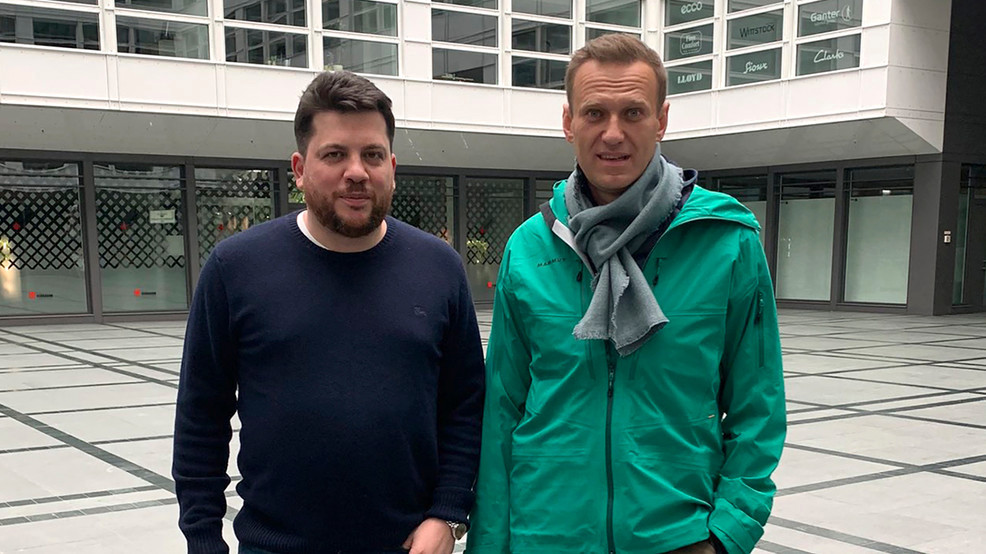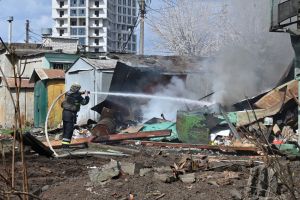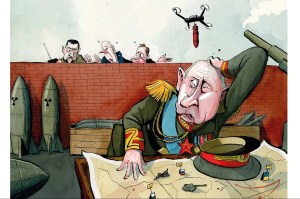Even with Alexei Navalny imprisoned, Russia’s opposition continues to struggle against Vladimir Putin and his quarter-century of Kremlin rule. This already daunting task has been made harder by the fact that key figures are now imprisoned or in exile: the opposition leader’s principal aides Vladimir Ashrukov and Leonid Volkov have fled to London and Vilnius respectively, while Navalny himself is serving a three-year prison sentence for supposed fraud.
Still, his inner circle continues to plan Putin’s downfall from beyond Russia’s border — and they now believe they have the support to succeed. The first stage, Volkov tells me, is mass protests. Already Navalny’s movement has led to thousands of people rallying in public since January. Yet the opposition’s aim now is to encourage a million people to take to the streets to demand, at a minimum, their leader’s release:
‘It is bigger than just calling for Navalny’s release. Our message is that if you are unhappy with Putin for any reason — whether it’s economical or political or ecological — join us. Because if you are a small group, you will be dispersed and not heard. Even if you are not a fan of Navalny, join us, so that we can rid the country of corruption. We believe a demonstration of a million people is possible.’
The strategy is perhaps more intricate than might be immediately apparent. According to Volkov, Putin himself is not the sole target:
‘It’s very clear that Putin’s political strategy is to stay in the Kremlin and of course he doesn’t want to go. But we are addressing not only Putin personally — we hope to achieve some kind of split within his elite. We want to make some of his cronies and supporters rethink their personal strategies. That’s the most plausible strategy for possible change. So maybe at some point his core supporters will see the wave of protests and see that it will be a better strategy to get out.’
Part of that plan to split the regime relies on the West targeting Putin and his cronies’ cash: ‘The West should go after his money. If you want to have leverage against Putin, if you want to push him, you have to go after his money. That’s the only thing that could actually be painful for him.’ Earlier this year, Navalny’s team published a viral documentary into Putin’s secret palace on the Black Sea sea, supposedly the aging autocrat’s post-retirement dacha:
‘The most important lesson learnt by our investigations into Putin’s palace was not that he has such a terrific, luxurious property by the sea. What we saw there was like looking into his mind, into his skull. The man has had 20 years of power in the country — he could have fulfilled any dream. But apparently his only dream was to have a big house with a lot of gold and red satin rooms. He probably visited Versailles as a tourist and that impressed him. He really cares about personal wealth.’
Volkov believes Putin is probably one of the wealthiest men in the world — despite his comparatively modest presidential salary. Like many oligarchs, a sizable chunk of his wealth will be held offshore, just in case Putin’s successor decides to rekindle Russia’s long history of purges. As last year’s report into Russian meddling in the UK explained: ‘London has provided the ideal environment for illicit Russian money, with major establishments and institutions all involved…there are a lot of Russians with very close links to Putin who are well integrated into the UK business and social scene and accepted because of their wealth.’
So why has Britain, and the West more broadly, been unable to deal with dodgy Russian wealth stashed within their shores? Volkov explains:
‘There is no political will. Officially, the flow of capital from Russia to the West is $50 to $60 billion, but the true figure is probably much higher. This money is being pumped into the European economy — it creates jobs. For example, when an oligarch builds a new luxury yacht in Amsterdam, or buys an apartment building in Mayfair, of course this creates benefits for the local economy.
‘But one also has to admit that just like with drug addiction, the longer this goes on, the harder it is to get clean. And this is a drug, a poison. The addiction is growing, but at some point in time, Europe will have to rid itself of this dirty money, because this dirty money itself corrupts European institutions. This cash is part of a package deal that comes with corruption. The decision to get clean of this drug of Russian money will have to happen, but the earlier that happens, the better.’
The notion of help from the outside world is a recurring theme for a hypothetical post-Putin government. ‘Russia has always been an important European country and power,’ Volkov explains. ‘Polls show that Russians are keen on the idea of open and free trade with Europe. They would be very excited to become members of the EU in the future, too. We don’t see any fundamental obstacles in the way of this, despite the fact that obviously a lot has to be rebuilt and created before that.’
He concedes, however, that any notion of ‘Navalnyism’ may seem unusual to the Western understandings of politics; the idea that anti-corruption is the sole principle of a party bears more resemblance to the politics of the developing work:
‘Being anti-corruption is actually a philosophy, because Putin’s Russia is built on it. You can’t describe Putin in terms that are familiar for a British audience. For instance, is Putin a liberal? Well, yes. We have a flat-rate for income tax — something every libertarian would dream of. Is Putin a leftist? Definitely so, since we have free healthcare and free education, with no tuition fees for universities and so on. Is Putin a nationalist? Absolutely: he annexed the Crimea, he talks a lot about ‘protecting Russian people’ and tries to spread Russian cultural influence elsewhere. Neither Navalny nor Putin belong on the political spectrum — the Western notions of the left-right divide do not apply to Russian politics nowadays.’
Putin’s seemingly contradictory politics is partly conditioned. His former spin doctor, Vladislav Surkov, is renowned for using post-modernist ideas to manipulate Putin’s image. The Kremlin is known to have directly funded both ultranationalist organizations and liberal civil society movements. What’s more, Surkov’s critics suggest he wanted people to know, that a paradoxical Putin would fill the political space. Putin can plausibly claim to be all things to all Russians, while coherent criticism is difficult when the subject of that analysis is himself willfully incoherent. Volkov continues:
‘Navalny basically wants to break this system by reinstating political institutions — independent courts, fair elections and a free media. These are the basic institutions which don’t allow corruption to happen. If there is an independent court or free elections, then of course corruption can’t last, or can be overwhelmed.
‘And so we are talking about Navalny’s political philosophy as building a regular European country. The tools that determine whether your country is left wing or right wing are the courts, the media and the elections — Russia lacks all of these. Russian citizens are not in a position to discuss if they want a more liberal or more conservative economy. Our political philosophy is to give them those tools and let them decide.’
Whether Navalny’s movement can muster enough Western support is questionable. His pro-Western stance has been tarnished by old comments and affiliations prior to his international fame, with valid speculation remaining over whether he would orient Russia towards the West should he ever win the Kremlin. Navalny’s links to ultranationalist groups, his anti-immigrant sentiments and support for Russia’s war against Georgia in 2008 have led to condemnation from Amnesty International.
Yet his campaign seems determined to enact a complete rebrand, with public declarations of support for LGBT rights, Black Lives Matter and assurances from Volkov that Navalny regrets his prior statements. With these have also come promises that should Moscow ever see a President Navalny, Russia’s aggressive foreign policy will end, as will support for those unrecognized independent republics that have sprung up as a result of Russian-backed separatist movements:
‘Putin has created many wounds on the world map in his 20 years in power. Transnistria, South Ossetia, Abkhazia, Crimea, Eastern Ukraine — there could be more. Belarus could be the next one, there’s Syria, too, of course. Every time Putin experiences some problems with his approval ratings back in Russia, he tries to get it back with some foreign political adventure, usually with the use of military power. We’ve actually made use of this in our campaign — the most enthusiastic responses from the audiences we spoke to came from when he said ‘we are investing millions in Syria, wouldn’t we rather invest that money in rebuilding Russian cities?’
Volkov insists that domestic support for foreign military intervention has waned over the years. ‘Even though, unfortunately, the annexation of Crimea was received enthusiastically by Russian voters in 2014, now the Crimean effect has faded drastically — everyone understands at this point that it’s a liability.’
Russia suffered a severe financial crisis in the years after the Crimean invasion, partly due to international sanctions levied against the increasingly rogue state. The collapse in oil prices, which last year saw the price per barrel drop below zero and the country’s relatively poor response to the pandemic have damaged any chance of a sustained recovery. The exiled chief of staff explains: ‘Putin supporters still enthusiastic about the Crimea now realize it’s just another huge financial burden, and while they think it’s good to violate international borders and treaties, they don’t like the financial burdens — billions are being spent on these military adventures.’
However, he admits that repairing the damage caused by Russian military action will be a daunting task: ‘Unfortunately not every crime is easily reversible. When someone has been killed, you can punish the murderer but you can’t revive the victim. With the Crimea issue, of course, we admit that the annexation was a crime against international law and Russian national interests because it has made Russia a non-credible actor in international relations and led to sanctions against the country.’
The country’s position as a new global pariah has seen it labelled as the UK’s most immediate ‘active threat’ in the latest integrated review into foreign and security policy. Volkov is emphatic that Navalny’s Kremlin will not continue the financial and military support for breakaway territories like the Donbas in eastern Ukraine. ‘It’s not for the benefit of Russian taxpayers to pump more money into these places. We believe the discontinuation of enormous financial giveaways will also open some ways for possible settlements of these crises through international cooperation.’
Navalny himself is struggling with health issues after his Novichok poisoning last year, problems that have been exacerbated by his incarceration. He has complained to his lawyers that he has been subject to sleep deprivation torture on the pretext of ensuring that he is not attempting to escape. His health has now deteriorated to the point where he has been moved to the penal colony’s hospital ward; a high temperature and respiratory issues have led to speculation that the opposition leader has contracted Covid-19, but since several other prisoners apparently have tuberculosis, this is also considered a possibility.
Volkov and Navalny’s team are hoping that the international attention on Putin’s foe will keep him alive. ‘Putin was still smart enough not to order him shot,’ Volkov says. ‘And now that the world knows that Navalny is in Putin’s custody, if anything could be considered protection, it would be this.’
But there is a distinct risk that COVID-19 and TB may succeed where the Kremlin’s assassination attempts fail.
Likewise, even though Navalny’s team are hoping to schedule rallies of an unprecedented scale for when Russia’s harsh weather conditions abate, viral stories of police brutality and sudden losses of employment for standing against the Putin regime will not be encouraging. Mr Volkov is certainly correct in his estimation that the movement’s best chance of success will come through splitting the regime — but whether this will be forthcoming appears doubtful.
This article was originally published on The Spectator’s UK website.


















